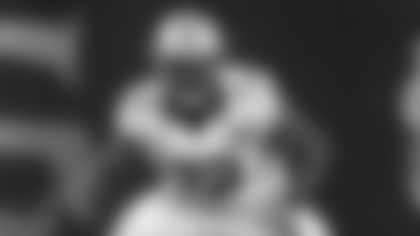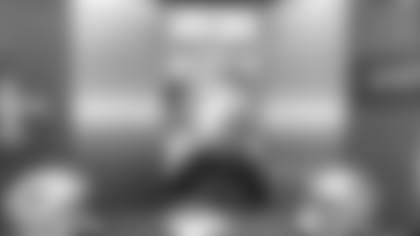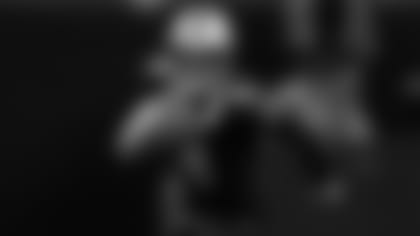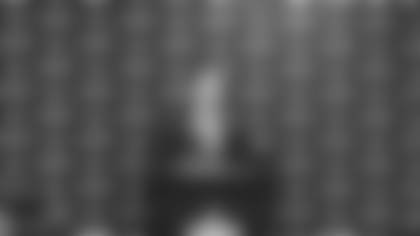In Ronald Curry’s first season as receivers coach for the New Orleans Saints, Michael Thomas caught an NFL-record 149 passes. Not a bad entry on the resume for Curry, regardless of how polished and accomplished Thomas already was. But this offseason, Curry, a two-sport high school superstar (basketball point guard, football quarterback) and two-sport college athlete, and the Saints added another accomplished receiver (Emmanuel Sanders) to the room. And there's the continued grooming of young prospects Tre'Quan Smith and Deonte Harris, among others. Curry will help with the process by leaning on his years as a high school and college quarterback, and his time as an NFL receiver (from 2002-08).
Q: What do you think about your group this season?
Curry: I think that (Emmanuel) Sanders is a welcome addition. He's a veteran, he's played in some big games – played in the Super Bowl (with San Francisco) last year. He's played with some great quarterbacks, (like) Peyton Manning, so the adjustment with Drew (Brees) would be awesome. I'm looking forward to the veteran leadership. I think one of Ted Ginn's best attributes was his leadership in that room. With him departing, I think (Sanders) can come in and fill those shoes. He's a special talent, he's a unique talent. I think him and Drew are going to hit it off. Obviously, we have Mike Thomas and Deonte Harris. I'm looking forward to the growth of those guys going forward. We have a great room, some hard workers, guys that are coachable and guys that are football junkies. They take their job seriously and it's a pleasure to coach them every day.
Q: How do you see the team going forward, integrating Deonte Harris more into the offense and what you do?
Curry: Last year, he would come in, he had a certain role. We like to bring the young guys along slow, put them at one position, bring him in and kind of back Ted Ginn up, doing some reverses and things of that nature. But just getting to know him a little bit better – he missed a lot of training camp time with a hamstring (injury), so it was slow for him to get going. And it's hard that we didn't have an offseason this year, so it's kind of hard to say how much he's grown. But I'm pretty sure he's somewhere putting in work. It's just seeing what he can handle. He'll come in and his role will expand. If you've been in our offense or been around this team, you know that guys fall into a role and we have 30 days (of training camp) to kind of figure out what his role will be.
Q: You played quarterback (in high school and college), you were one of three dozen coaches selected to participate in the third annual Quarterback Coaching Summit sponsored by the NFL, in partnership with the Black College Hall of Fame. How much does that help you in teaching receivers?
Curry: I played quarterback, (and) I never stopped learning the game as a quarterback. I think that's something that's helped me as a coach and as a player when I moved to the position of receiver. I learned all the positions, I could line up and read the coverage and know exactly where the ball was supposed to go. And I try to teach the guys the same way. Don't just learn your position. Learn coverages, learn the technique of defenders. And when you go to things like (the summit), you hear the perspectives of a lot of other different coaches and how they go about their business every day. This is the second system that I've been in – one with the 49ers (as offensive assistant, then receivers coach from 2013-15) and the one here – to where there's a lot of production in both offenses. But they're done totally different, two totally different styles. And when you go to these things, you notice that it's a lot of system, there's a lot of learning, there's a lot of things that go on. I consider myself a young coach, so I sit there, mouth closed, ears open, and then just take it in and bring back the things that I've learned there, and try to implement it here. Some of the stuff works, some of it doesn't. This system (in New Orleans) has been around for 13, 14 years and it's been highly productive, and it's always evolving. Anything I can bring to the table that I've learned somewhere else, I try to do that.
Q: Tre'Quan Smith had injuries slow him last year. What are some of the next steps you want to see with him?
Curry: I love Tre'Quan. I loved him coming out, spent a lot of time watching film on him before we decided to draft him. He's a unique player. Everybody falls into a role. Tre'Quan has got skinny legs and skinny arms, but he's stronger than you think. He's smart, he knows the game of football, he puts in the work. He just needs to continue to play football, continue to get opportunities. (He needs to) fix his stance; I think once he fixes his stance he'll be a little bit more explosive. We joke about that all the time. But he's a special player, he just needs some opportunities. A lot of people give us slack about needing guys because Mike Thomas gets all the balls, (but) Mike Thomas is a hell of a player. Tre'Quan kind of gets slighted. When it comes to that, it's not that we don't have a good guy on the other side, it's just that Mike Thomas gets a lot of the passes. (Smith) takes it. Coach gets on him sometimes, (but) you can coach him hard. I just think he needs to continue to show up. When the opportunity has presented itself, he has stepped up to the occasion. He just needs more opportunity.
Q: Where do you see Emmanuel Butler growing, and where do you see him in his development?
Curry: He's another young guy, he's going to have to compete. I think with him, he's going to have to have a little bit more growth on special teams. We saw him in training camp (last year) making a lot of plays, but then he suffered an injury that really set him back. It happened when preseason was about to start; it would have been great to see him continue to grow. The thing about him is, he was able to play the position that Mike (Thomas) plays, so when we were trying to save Mike (in practice), he got a lot of opportunities that would have probably gone to Mike. Now that he's in the second year in this offense, I'm looking for him to play some other positions, give himself a better chance of making the team. He's a great kid. He works, he loves the work. He just needs to grow a little bit on special teams and continue what he's been doing and build on top of that.
Q: When you're working with a guy like (senior offensive assistant Curtis Johnson), who's a fairly dominant personality, how's the dynamic of that relationship?
Curry: It's great. C.J. has a great personality. He keeps the room light, he jokes, he's just a veteran. He lets me go about my business the way I need to go about my business. He encourages it, he develops not only players, but coaches and human beings. He's probably one of the best coaches that I've been around just all-around as far as coaching. That's the good thing about him. There's a lot of coaches that you're going to be around, especially when you're young. They try to keep you in your place and only allow you to grow at their rate and C.J. isn't like that. He treats you like one of his own. His house is always open. C.J. is C.J., what you see is what you get. He's loud when he comes in the room, but he's always preaching knowledge and from me to the last coach on the staff, to Sean Payton, to (General Manager) Mickey (Loomis), just everybody. He's a likeable guy to be around. You can't always say that in this profession, but he's one of the best ones you're going to be around.
Q: We've heard a lot from the coaches on this staff talking about visions for players, so what is your vision for (Emmanuel) Sanders? How do you see him fitting into this offense?
Curry: We're going to try to put together what he does best. The beauty about this system and the reason why nobody has caught up to it yet is Sean Payton knows how to move guys around. He knows how to take advantage of their unique talents. He tries to put these guys in positions to where you keep them out of the things that they don't do well and you enhance the stuff that they can. So it's hard to say exactly what you're going to do for Sanders and his vision until you really get your hands on him. You see the things he did in San Francisco last year, but our offense is kind of different from San Fran. You kind of need to go back to his Denver days when he was playing with Peyton (Manning). He's a transition player, you want to get the ball in his hands, you've got a vision for him on third-down, win your one-on-one matchups in the red-zone. You feel like he's going to fit in like Ted Ginn, like a veteran that's going to be where he's supposed to be, on time, for Drew (Brees). Drew is a person that (Sanders) needs a lot of work with. It doesn't matter who it is that comes in here, (Brees) likes to find ways to work with guys and seeing their body language and how they get in and out of routes. We have a vision for him on third down and how we can use him, maybe taking some of that option stuff off of (Alvin Kamara's) plate and some of the stuff that Ted Ginn was doing, double moves, transitional stuff. There's a lot of stuff in this offense. (There's a lot of things he needs to know) to try and get involved, but we've got to see what he can handle first, too.
Q: Whatever limitations Deonte (Harris) is working with because of his size, do you have to come up with a specific type of package for him or do you think he can kind of do it all regardless of being 5-foot-6 or whatever?
Curry: I don't see his size as a limitation. I feel like he had a package, because he was a young player and we had a vision for him to basically be the player that he was last year as far as a returner, a top returner in the league. We knew that would be his role and then he played behind Ted Ginn, Tre'Quan Smith and Mike Thomas. He had a limited role because he was up on game day as a returner and we just got him going on offense when we could. He came in with hamstring problems so we protected him as much as we could. Going forward, his role will increase just because he's been here for a year and he's going to be able to compete. It's kind of the same situation as far as the receiver numbers that are back, but he's a special talent. Guys of his stature have had great success in this league and I don't see that as a limitation. It's something that sometimes you're not going to be able to find him in the middle of the field, just Drew (Brees') height and his height, just a combination of both.
Q: Was his big catch against Minnesota in the wild card game an example of that?
Curry: Yeah, he's an example, just like the Tre'Quan (Smith) question about his production. It's not because the player can't play. It's more because when you're drawing up the offense, first you're going to think about Mike (Thomas) and then you're probably going to think about (Jared) Cook and then you're probably going to think about (Alvin Kamara). So by the time you get to these guys it's kind of like basketball, you're going to think about LeBron, LeBron, LeBron, until he has to kick it to the corner for somebody else to shoot. You don't draw those plays up for guys, the ball just finds them and that's just the way our offense works. A lot of the plays that I've drawn up for Tre'Quan and Shorty B (Harris), but eventually they double team Mike, they double team Cook and somebody has to step up and then the ball finds them. Basically that play was for him, it was meant for (quarterback) Taysom (Hill) to take a shot and Taysom threw a hell of a ball and (Harris) made a hell of a catch.














